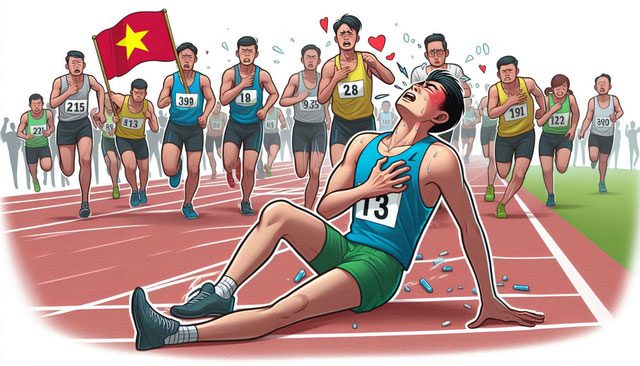Marathon is a great sports activity for health. However, if you do not pay attention to the following factors, there is a high possibility that it could harm your body.
Causes of Cardiac Arrest During Intense Exercise
During intense exercise, our hearts undergo significant changes, including:
- Increased Heart Rate: Like a machine fueled for more power, the heart begins to beat faster to pump more blood, meeting the increased oxygen demands of active muscles.
- Elevated Blood Pressure: Along with the heart rate, blood pressure also rises, helping to efficiently circulate blood throughout the body.
- Altered Cardiac Electrical Activity: Heart muscle cells continuously generate small electrical impulses to regulate heart rhythm. However, during intense exercise, the heart’s electrical activity may change, leading to an increased risk of arrhythmias.
- Hormonal Fluctuations: Certain hormones like adrenaline and cortisol are released during exercise, affecting heart rate and blood pressure.
- Increased Body Temperature: As the body exerts itself, temperature rises, requiring the heart to work harder to regulate body heat.
These changes are completely normal and necessary for the body to adapt to physical activity. However, in some individuals, especially those with underlying health conditions, these changes can lead to serious health issues.
Cardiac arrest during a marathon can stem from the following factors:
- Underlying Heart Conditions: This is the leading cause of cardiac arrest among marathon runners. According to a study published in the journal Heart, over 80% of cardiac arrest cases during marathons are due to underlying heart conditions, including coronary artery disease, valvular heart disease, or cardiomyopathy.
- Arrhythmias: Some individuals may experience arrhythmias even without heart disease. These arrhythmias, such as ventricular fibrillation or ventricular tachycardia, can lead to cardiac arrest during intense workouts.
- Dehydration and Electrolyte Imbalance: During a marathon, the body loses significant amounts of water and electrolytes through sweat. Dehydration and electrolyte imbalance can affect the heart’s electrical activity, leading to arrhythmias and cardiac arrest. A study published in the European Heart Journal found that dehydration and electrolyte loss can increase the risk of cardiac arrest in marathon runners by up to five times.
- Heat Stroke: Heat stroke can cause numerous serious health issues, including cardiac arrest. When experiencing heat stroke, the body cannot regulate temperature, leading to increased heart rate, blood pressure, and the risk of cardiac arrest.
- Stimulant Use: The use of certain stimulants, such as cocaine or amphetamines, can raise heart rate and blood pressure, resulting in cardiac arrest. Stimulant use can increase the risk of cardiac arrest in marathon runners by up to ten times.

The use of stimulants can increase the risk of cardiac arrest in marathon runners. (Illustrative image).
Precautions for Running a Marathon to Protect Your Health
- Comprehensive Health Check: This is a crucial first step to detect underlying heart diseases early—the leading cause of cardiac arrest during marathons. A health check should be performed at least six weeks before the event.
- Scientific Training: Gradually increase training intensity over time to help the body adapt to strenuous activities. Marathon runners should train for at least 12 weeks, covering a total distance of up to 300 km. Consult professionals to develop an appropriate training program.
- Hydration and Electrolyte Supplementation: Drink enough fluids and electrolyte solutions to prevent dehydration and electrolyte imbalance, which can affect the heart’s electrical activity. Pay attention to weather conditions: avoid running a marathon in hot or humid weather. Choose cooler running times, wear appropriate clothing, and use sun hats.
- Listen to Your Body: Recognize warning signs of cardiac arrest risk such as chest pain, shortness of breath, or dizziness. Stop running immediately and seek medical assistance if any signs occur.
- Avoid Stimulants: Do not use cocaine or amphetamines before or during the marathon, as they can increase heart rate and blood pressure.
- Use Health Monitoring Devices: Monitor heart rate and other health parameters to detect any abnormal signs early. Attend first aid courses: equip yourself with knowledge and skills to provide first aid to yourself or others in case of cardiac arrest.
- Follow Regulations: Always adhere to the rules and guidelines set by the marathon organizers to ensure safety for yourself and those around you.
Conquering a marathon is a challenging yet meaningful journey. By implementing effective preventive measures and adhering to safety principles, you can minimize the risk of cardiac arrest and fully enjoy the marathon experience safely.




















































